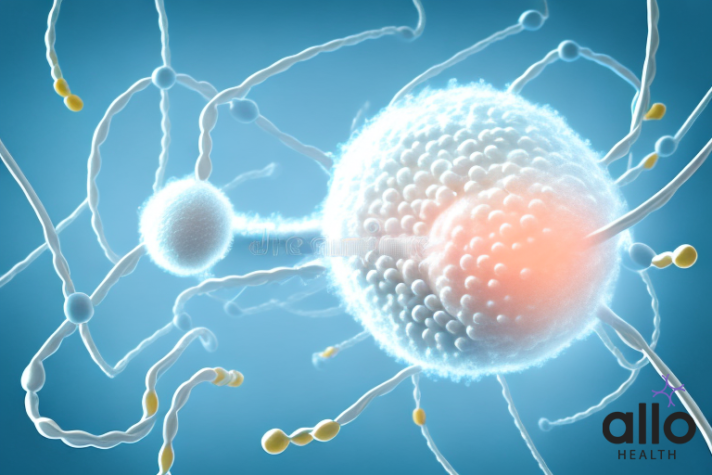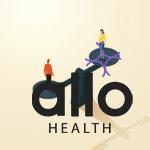Does Ejaculating Make You Lose Protein?

Allo Health is dedicated to personalized well-being, offering support and trusted information tailored to individual health goals. The platform emphasizes human-generated content, led by a distinguished medical team of experts, including physicians and sexual health specialists. Their commitment to credibility involves rigorous fact-checking, authoritative research, and continuous updates to ensure accurate, up-to-date information. Allo Health's unique approach goes beyond conventional platforms, providing expert-led insights and a continuous commitment to excellence, with user feedback playing a crucial role in shaping the platform's authoritative voice.

Dr. Raj. R holds an undergraduate medical degree from the Philippines, and has a bachelors background in Psychology. His experience working in the field of urology further brought his interest forward in working towards his passion of understanding the science of attraction, intimacy, sex and relationships. A key motto he practices by remains unprejudiced and non-judgemental care.
Why This Was Upated?
Our experts continually monitor the health and wellness space, and we update our articles when new information became available.
Updated on 05 June, 2024
- Article was updated as part of our commitment to diversity, equity, and inclusion.

"The following blog article provides general information and insights on various topics. However, it is important to note that the information presented is not intended as professional advice in any specific field or area. The content of this blog is for general educational and informational purposes only.
Book consultation
The content should not be interpreted as endorsement, recommendation, or guarantee of any product, service, or information mentioned. Readers are solely responsible for the decisions and actions they take based on the information provided in this blog. It is essential to exercise individual judgment, critical thinking, and personal responsibility when applying or implementing any information or suggestions discussed in the blog."
Ejaculation is a natural and healthy biological function experienced by males during sexual activity or masturbation. However, there has been a long-standing myth that ejaculation leads to protein loss, which can, in turn, cause protein deficiency. In this article, we will delve into the basics of protein loss through ejaculation, the science behind protein in semen, and the impact of ejaculation on overall health and wellness. So, let’s get started!
What Is Protein?
Proteins are large, complex molecules that play crucial roles in the structure and function of living organisms. They are one of the fundamental building blocks of life and are involved in a wide variety of biological processes. Here are some key aspects of proteins:
- Composition:
- Proteins are composed of smaller units called amino acids. There are 20 different types of amino acids that can be combined in various sequences to form a wide array of proteins.
- Amino acids contain a central carbon atom bonded to a hydrogen atom, an amino group (NH2), a carboxyl group (COOH), and a side chain (R group). The side chain varies among different amino acids, contributing to the diversity of proteins.
- Structure:
- Proteins have a hierarchical structure, consisting of primary, secondary, tertiary, and quaternary structures.
- The primary structure is the linear sequence of amino acids in a polypeptide chain.
- The secondary structure involves folding and twisting of the polypeptide chain into regular structures like alpha helices and beta sheets.
- The tertiary structure is the three-dimensional folding of the entire polypeptide chain, determined by interactions between amino acid side chains.
- The quaternary structure involves the association of multiple polypeptide chains to form a functional protein complex.
- Functions:
- Proteins serve a wide range of functions in living organisms. Some of the key roles include:
- Enzymes: Act as catalysts for biochemical reactions.
- Structural Proteins: Provide support and framework for cells and tissues (e.g., collagen in connective tissues).
- Transport Proteins: Carry molecules and ions across cell membranes.
- Hormones: Serve as signaling molecules that regulate various physiological processes.
- Antibodies: Play a critical role in the immune system by recognizing and neutralizing foreign substances.
- Contractile Proteins: Enable muscle contraction (e.g., actin and myosin).
- Storage Proteins: Store nutrients for later use (e.g., casein in milk).
- Proteins serve a wide range of functions in living organisms. Some of the key roles include:
- Synthesis:
- Protein synthesis occurs through a process called translation, where the information encoded in mRNA (messenger RNA) is used to build a specific sequence of amino acids.
- The process involves the ribosome, transfer RNA (tRNA), and various enzymes.
- Sources:
- Proteins are obtained through the diet and are found in a variety of foods, including meat, poultry, fish, eggs, dairy products, legumes, nuts, and seeds.
- Protein Folding and Misfolding:
- Proper protein folding is crucial for their functionality. Misfolded proteins can lead to various diseases, including neurodegenerative disorders like Alzheimer’s and Parkinson’s disease.
In summary, proteins are essential macromolecules with diverse structures and functions, playing critical roles in the structure, regulation, and maintenance of living organisms.

What Are Ways In Which Protein Can Be Lost?
Proteins can be lost from the body through various mechanisms, and this loss can occur under normal physiological conditions or as a result of certain health conditions. Here are several ways in which protein loss can occur:
- Urine: The kidneys filter the blood to remove waste products and excess substances, including excess proteins. Under normal circumstances, only small amounts of protein should be present in the urine. However, conditions such as kidney disease or glomerular damage can lead to increased protein leakage into the urine, a condition known as proteinuria.
- Digestive System: Malabsorption disorders or diseases affecting the gastrointestinal tract can lead to protein loss through the digestive system. Conditions like celiac disease, inflammatory bowel disease (IBD), and certain infections can impair the absorption of proteins from the digestive tract.
- Skin: Severe burns or extensive skin injuries can result in protein loss. The skin contains proteins, and when it is damaged, these proteins may be lost through open wounds or burns.
- Blood Loss: Trauma, surgery, or certain medical conditions can lead to significant blood loss, which may result in the loss of blood proteins, including hemoglobin and clotting factors.
- Sweat: While sweat primarily contains water and electrolytes, small amounts of proteins can be lost through perspiration during intense physical activity or in certain medical conditions.
- Hair and Nails: Hair and nails are composed of a protein called keratin. Hair loss or shedding and nail disorders can result in the loss of protein from the body.
- Menstrual Blood: Menstruation involves the shedding of the uterine lining, which contains blood and proteins. While the protein loss through menstruation is relatively small compared to other sources, it contributes to overall protein turnover.
- Conditions Leading to Increased Protein Catabolism: Certain medical conditions or states of stress, such as severe illness, infections, or prolonged fasting, can increase the breakdown of proteins in the body, leading to a net loss of protein.
- Inadequate Dietary Intake: A diet deficient in protein can lead to a lack of essential amino acids, impairing the body’s ability to synthesize proteins. Chronic protein deficiency can result in muscle wasting and other health concerns.
It’s important to note that while some protein loss is a normal part of physiological processes, excessive or prolonged protein loss can have detrimental effects on health. Conditions leading to abnormal protein loss may require medical attention and intervention to address the underlying causes. Adequate protein intake through a balanced diet is crucial to maintain the body’s protein balance and support various physiological functions.
Does Ejaculating Make You Lose Protein?
No, ejaculating does not cause a significant loss of protein from the body. The notion that ejaculating leads to a loss of protein might stem from a misunderstanding of the composition of semen. Semen does contain various components, including sperm cells, enzymes, fructose, and small amounts of proteins, but the protein content is relatively low.
The proteins found in semen are primarily derived from the prostate gland, seminal vesicles, and other accessory glands. These proteins are present in small quantities and are not a substantial source of protein for the body. The overall protein content in the ejaculate is a tiny fraction of the total protein in the body.
Moreover, the body continuously produces and replaces proteins through dietary intake and internal synthesis. Ejaculating does not deplete the body of protein to an extent that would negatively impact overall protein balance. The proteins in semen are specific to reproductive functions and play a role in nourishing and supporting sperm during their journey.
It’s important to understand that protein loss through normal bodily functions, including ejaculating, is minimal and does not pose a risk of protein deficiency. Adequate protein intake through a balanced diet remains crucial for maintaining overall health and supporting various physiological functions. If there are concerns about protein intake, it is advisable to focus on maintaining a well-balanced diet rather than worrying about the protein content in semen.
Most Asked Questions
-
Does ejaculating result in a giant lack of protein from the body?
No, ejaculating does now not reason a super lack of protein. While semen includes small amounts of proteins, the general protein content material is minimum and not a enormous contributor to the frame's protein stability. The proteins in semen serve reproductive features and are not a massive nutritional or physiological concern.
-
Can ejaculating deplete the body of crucial proteins?
No, the proteins in semen aren't a primary source of important nutrients for the body. Ejaculating does no longer use up the frame of vital proteins to an volume that could impact overall fitness. Adequate protein consumption through a balanced weight-reduction plan is important for preserving the body's protein stability.
-
Is protein loss via ejaculation a situation for standard health?
No, the small amount of protein in semen is unique to reproductive features and does not pose a situation for standard health. Protein loss via ejaculation is minimum and does not make a contribution considerably to the body's total protein content. Maintaining a well-balanced diet is prime to assembly protein needs.
-
Should individuals worry about protein deficiency because of ejaculating?
No, disturbing about protein deficiency due to ejaculating is unfounded. The frame constantly produces and replaces proteins thru dietary consumption and internal synthesis. Ejaculating does not cause a big loss of protein that would result in deficiencies when a balanced diet is maintained.
-
Is there a want to adjust nutritional protein consumption based totally on ejaculation frequency?
No, there may be no need to regulate dietary protein consumption based on how frequently one ejaculates. Protein needs are mainly encouraged by using elements which includes age, sex, interest degree, and universal health. Maintaining a properly-balanced weight loss program that meets normal nutritional necessities is greater essential than specializing in protein loss thru ejaculation.






































